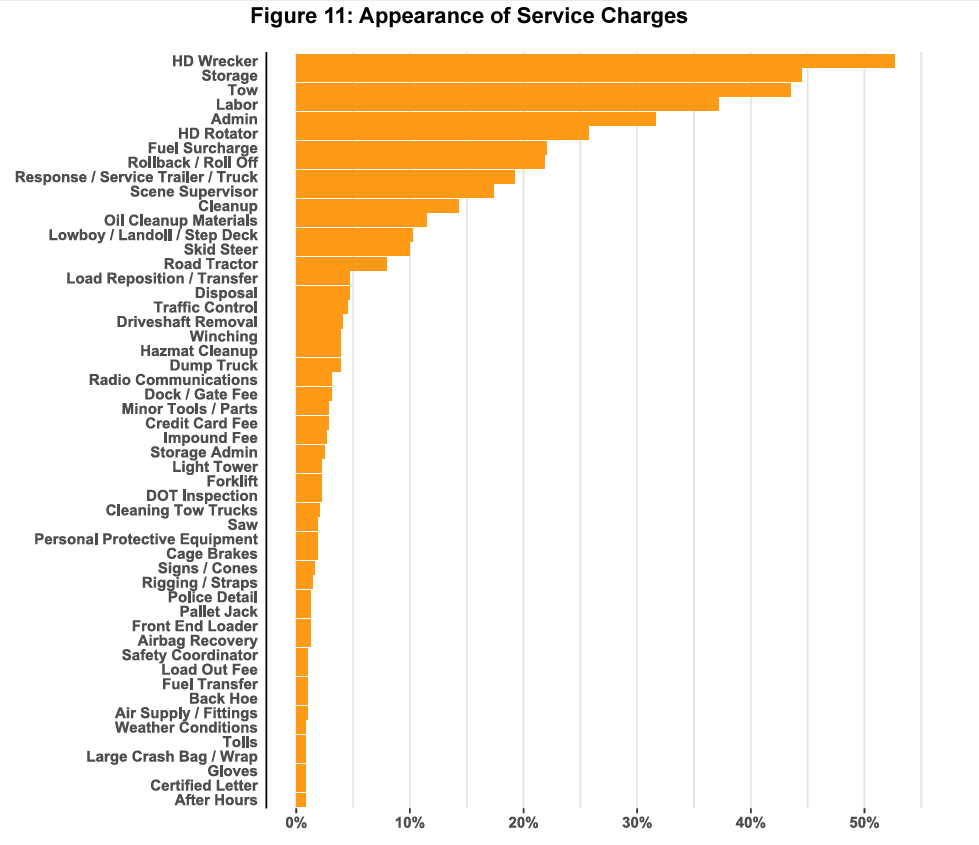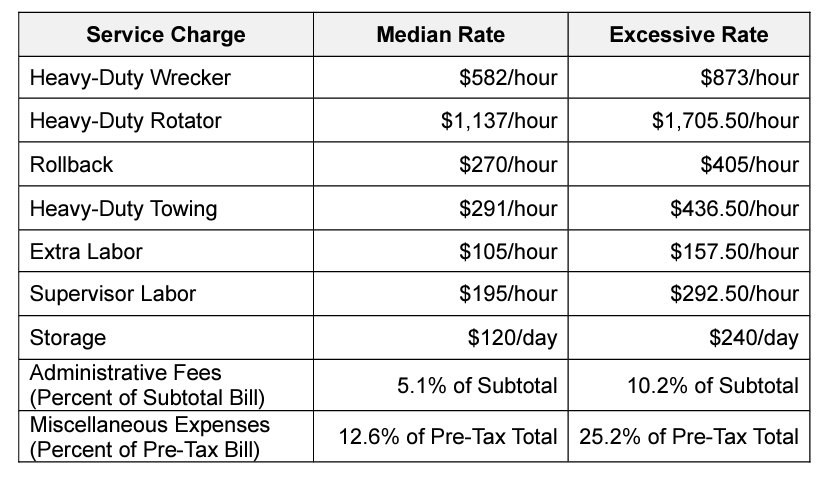30% of crash-related tows include predatory billing: ATRI
An American Transportation Research Institute (ATRI) study of carrier invoices has found that 30% of all crash-related tows in the U.S. include some form of predatory billing.
The research — published in Causes and Countermeasures of Predatory Towing — involved examining carrier invoices from 2021 to 2023, and considered situations where towing and recovery (T&R) providers overcharge, illegally seize equipment, damage assets by using the wrong equipment, or withhold assets that should be released.
Even if insurers pay the lion’s share of such invoices, the costs are still passed on to carriers in the form of higher premiums.
“Predatory towing is a costly issue for motor carriers as well as compliant towing companies, and it has been overlooked for too long,” said Shawn R. Brown, Cargo Transporters’ vice-president of safety, in a press release.

Earlier this year, one company received a US$6,000 bill for a 16-mile (25.7 kilometre) tow, while in 2020 a carrier in Virginia was charged US$202,000 to recover and tow a truck involved in a single-vehicle incident, the report offered as examples.
Excessive towing and recovery rates
Excessive towing and recovery rates are experienced by 82.7% of motor carriers, while 81.8% of carriers face unwarranted service charges, ATRI says.
Overcharges occur through excessive hourly, per-mile, or per-pound costs, or charges for unnecessary equipment. For example, miscellaneous service charges were found in 8% of invoices, while over 6% of invoices included excessive administrative fees and equipment rates.
Other overcharging practices cited in the research include high daily storage rates, access issues, cargo and vehicle release delays, tows misrepresented as consensual decisions, and damage due to improper equipment use.

Such predatory issues lie in the fact that carriers are not able to choose their own towing and recovery company in a nonconsensual tow, the organization adds.
ATRI’s research shows that carriers can use the towing and recovery service of choice in just 10% of crashes. Meanwhile, 36% of carriers responded that they never have the opportunity to select a towing and recovery company after an incident.
Because quick road clearance is one of the Federal Highway Administration’s Traffic Incident Management best practices, several states even pay incentives to towing and recovery companies for quickly moving hazards and obstructions.
Billing practices are not standardized, either, which worsens the issue. For example, one in four crash-related invoices analyzed by ATRI were not itemized.
Are towing companies responsible for predatory pricing?
However, ATRI says towing and recovery companies are not always at fault for these issues. Assets may simply be over deployed in a legitimate bid to avoid extra delays and costs.
“For example, T&R company interviewees stressed that under-deployment of equipment – especially when a crash requires substantial travel time – can be costly, as entire response crews may have to wait for additional T&R assets to be deployed,” the report says.
“T&R company interviewees also reported that, when they receive incomplete or miscommunicated information, they may deploy [and thus bill] more equipment for a crash than was ultimately necessary.”
Such companies often rely on commercial truck drivers, law enforcement officers, or public safety dispatchers to determine how complex a recovery will be.
How to respond to excess recovery costs
ATRI identified several strategies to mitigate the predatory towing problem, such as itemizing invoices to tackle excessive hourly or per-pound rates.
When responding to excessive rates, carriers should consult with police logs and reports, state or municipal regulations, and rates charged by other T&R companies in the area, and correlate actual and billed mileage between crash scenes and tow yards, ATRI says. It also stresses the value of developing business relationships with local T&R companies in the areas where a business operates.
States should create centralized conflict resolution channels to resolve any issues with towing rates without relying on local courts or Attorneys General Offices, ATRI adds. It also calls on states to prevent private property tows without a property owner’s consent, mandate cargo releases, and limit the liens towing and recovery companies have on cargo.
There’s even a role for drivers.
To disprove any misreported invoices, drivers need to photograph crash sites, crashed vehicles, and recovery processes, ATRI says. This would also help document any improper handling to address damages. But truck drivers should never sign consent forms during a police-initiated tow, ATRI warns, saying that these could reclassify a nonconsensual tow as consensual.
Meanwhile, additional training for drivers, police, and public safety dispatchers on how to report and manage heavy-duty crashes would help ensure towing and recovery equipment is not over deployed, it says.
The full copy of the report on the causes and countermeasures of predatory towing can be downloaded here.
Have your say
This is a moderated forum. Comments will no longer be published unless they are accompanied by a first and last name and a verifiable email address. (Today's Trucking will not publish or share the email address.) Profane language and content deemed to be libelous, racist, or threatening in nature will not be published under any circumstances.
We need in Canada to have I certain parts of he country a large truck stop with a min of 300 regular semi units and 50 dropped trailers and. A 4 bay repair shop plus at least 1 more bay for tow truck and first response vehicle (s)
The repair bay s and the towing truck ( s) run as a co op with member prices and 15 percent more to larger trucking companies that do not contribute to the cost of setting up of 7 of these across Canada. This would be the best way along with towing companies to have their insurance costs 50 % paid for by the gov if they are run as a co op or agree charge a certain of rates and be part of a first response team in time of disasters or states of emergency.
The towing companies have you over a barrel and they know it. They can charge what they like and get away with it.
Further to predatory towing is predatory body shop costs. Insurance claim or company paying…